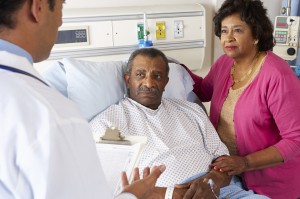Last year, the BBC released a scandalous film that highlighted the poor care to which brain injury victims are routinely subjected. Audiences were aghast to see health care workers in their own national healthcare system treating rehabilitation center patients with carelessness — at best — and often with actions bordering on abusive. Safety procedures were ignored, hygiene was neglected and, in at least one case, doctors’ orders were directly violated.
The film was made by the spouse of one
brain injury patient whose concerns over  her partner’s well-being were repeatedly ignored. Rather than give up, she installed a secret camera in his room. Among other things, the footage showed a health care assistant cleaning the patient’s stomach tube with the tip of a pen, and giving him drinks of water even though he was supposed to receive nothing through the mouth.
her partner’s well-being were repeatedly ignored. Rather than give up, she installed a secret camera in his room. Among other things, the footage showed a health care assistant cleaning the patient’s stomach tube with the tip of a pen, and giving him drinks of water even though he was supposed to receive nothing through the mouth.
The film brought much-needed attention to the plight of brain injury patients in Britain’s National Healthcare System. But it also shows the awful effects that ignorance and lack of care have on the well-being of a victim of brain trauma. Even those who are surrounded by a loving support system can suffer due to a family’s lack of information or assumptions about their condition.
In addition to helping brain injury victims get justice and legal resources to improve their lives, we at the Brain Injury Law Center want to help our community with resources for learning what to expect in this new chapter of their lives and how to offer the best possible support to a loved one suffering from brain injury or trauma.
Here are a few of the things we’ve learned.
Know What to Expect
Every brain injury produces different results, and thus every victim of brain injury is unique. However, here are some cognitive and physical changes common to most brain injury situations:
- Shortened attention span
- Memory problems
- Problem-solving difficulties
- Poor judgment
- Partial or complete loss of reading and writing skills
- Language problems, including communication deficits and loss of vocabulary
- Inability to understand abstract concepts
- Difficulty learning new things
- Weakness
- Muscle coordination problems
- Full or partial paralysis
- Changes in sexual functioning
- Changes in the senses (hearing, sight, touch, etc.)
- Seizures (also called traumatic epilepsy)
- Sleep problems
- Speech difficulties
In addition, the personality of a brain injury victim frequently undergoes a change, since the brain is processing stimuli and information differently than before. Here are some behavioral changes that may occur:
- Difficulty with social skills
- Inability to empathize with others
- Tendency to be more self-centered
- Inability to control one’s emotions
- Increases in irritability and frustration
- Inappropriate and/or aggressive behavior
- Extreme mood swings
- Depression (individuals with TBI are considered to be at a high risk for depression)
Self Care
Your brain is the command center of the rest of your body, not to mention your emotions and, obviously, your intelligence. You wouldn’t rush someone who had broken their leg or suffered a gunshot wound; it’s equally important to give a brain injury patient time and space to heal. Caregivers should also encourage the patient to give himself or herself that time and space. Victims of brain trauma frequently get frustrated with their inability to heal faster. Encourage your loved one suffering with brain injury to do the following:
- Get lots of rest.
- Avoid doing anything that could cause another blow or jolt to the head.
- Ask the doctor when it’s safe to drive a car, ride a bike, play sports or use heavy equipment because reaction time may be slower after a brain injury.
- Take prescription medication according to the doctor’s instructions.
- Do not drink alcohol or use street drugs.
- Write things down to help with memory problems.
- Ask the doctor to recommend rehabilitation services that might help recovery, and follow those recommendations.
In addition, you as the caregiver must take care of yourself. Your loved one needs you to stay healthy and monitor your own well-being, in order to receive the best care possible from you. Family Caregiver Alliance puts out a wonderful fact sheet on self-care for family caregivers.
Don’t Go It Alone
Several resources exist, both locally and nationally, for the caregivers of brain injury patients. In addition to support groups and advocacy organizations, Caregiver.org is replete with answers, advice and suggestions for where to find compassionate company in your situation.
The team at the Brain Injury Law Center is among this group. We are people who understand what you’re going through and are committed to helping you recover your life when a family needs legal assistance after a brain injury. Call us at (757) 244-7000 for a no-cost, no-obligation consultation, or fill out the Free Case Review form on the right side of this page.


